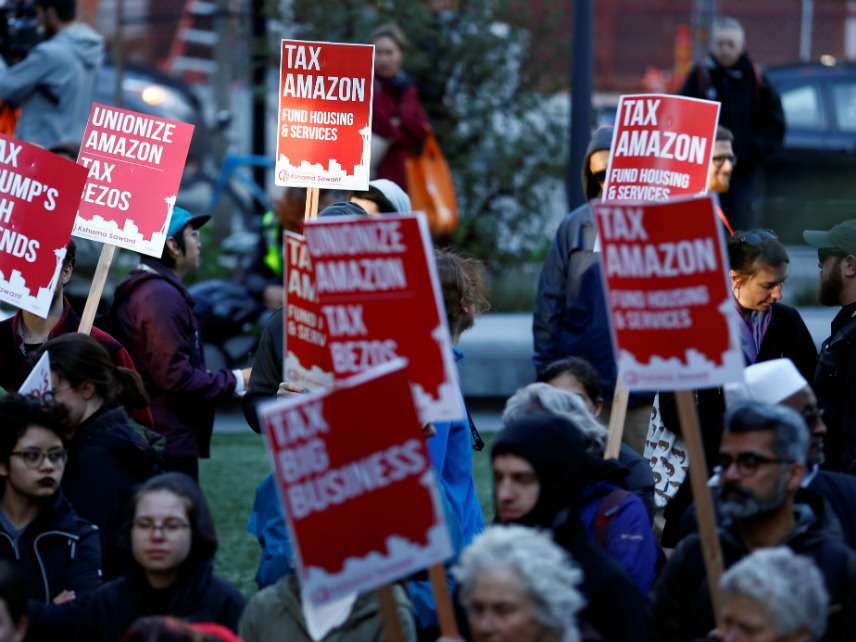Seattle Now Wants to Repeal Controversial Amazon Tax
Tax proponents folded rather than defend the tax from a increasingly popular voter initiative to repeal the tax.

Less than a month after unanimously passing a literal tax on jobs, the Seattle City Council is looking to reverse course.
Yesterday Seattle Mayor Jenny Durkan, along with seven of nine city councilmembers, released a statement announcing their intention to repeal the controversial employee head tax.
"It is clear that the ordinance will lead to a prolonged, expensive political fight over the next five months that will do nothing to tackle our urgent housing and homelessness crisis," reads Monday's statement. "This week, the City Council is moving forward with the consideration of legislation to repeal the current tax on large businesses to address the homelessness crisis."
Had the City Council not killed its own head tax, voters might have.
Almost immediately after Durkan signed the tax into law, an initiative campaign was launched to put the head tax on the November 2019 ballot. Within days the campaign had attracted $300,000 in funding including $25,000 a piece from Starbucks and Amazon. The effort reportedly gathered 22,000 signatures by June 7, comfortably above the 17,000 it needed before its June 14 deadline.
Rather than risk an expensive ballot campaign that public opinion polling suggested would not go its way, the council has decided to pull the tax and try again.
The initial version of the head tax—known as the "Amazon Tax" after its main rhetorical target—would have imposed a yearly $500 levy on every employee at companies grossing over $20 million. This was supposed to raise $75 million annually from 500 to 600 Seattle businesses for homeless and affordable housing services.
That proposal sparked fierce opposition from all corners of the city. Seattle-headquartered Amazon paused construction on an office tower project pending a vote on the tax. Starbucks came out publicly against the tax, as did Alaska Airlines, Expedia, and the CEOs of 129 other Seattle-area companies in an open letter.
The business community was joined in their opposition by the city's construction unions. Chris McClean of Iron Workers Local 86 told The Seattle Times that "to reduce the jobs only increases the possibility of additional homelessness." His union brothers shouted down pro-head tax city councilmember Kshama Sawant at one of her anti-Amazon rallies.
The head tax was even too much for former Seattle Mayor Tim Burgess, a champion of such progressive policies the city's soda and income taxes. Burgess co-authored an op-ed in the Seattle Times calling the head tax a "terrible idea."
All the pushback was enough to prompt Durkan to float a compromise head tax of only $275 per employee per year, which would have raised $47 million annually. This saving measure proved ineffective at quelling the passions stirred over the tax.
As columnist Knute Berger wrote at Seattle news site Crosscut, "the mayor had forced an unsavory compromise by signing a head tax that was less than originally proposed yet still too much to win Amazon's support or tolerance, and a spending plan that was not well-devised before the vote."
The Amazon tax is not the first example of the Seattle city council putting the cart before the horse. The city-level progressive income tax passed last year by the council was ruled illegal in November 2017 on the grounds that Washington state law explicitly forbids cities from imposing an income tax. A city appeal of that decision is still pending.
The reaction to Monday's about-face suggests that while the fight over the head tax is over for now, the tensions it kicked up have not dissipated.
Seattle's hard left was positively incensed at the reversal. "Councilmembers who said they agree w/ big biz tax to fund affordable housing now want to repeal Amazon Tax coz blatant lies by big biz have impacted public opinion," tweeted out Sawant who says she was left out of the loop on the decision to ditch the head tax.
For their part, business owners stressed that the city needed to spend the money it has more effectively before it goes around asking for more. "I strongly believe that there is a better way forward, one that improves current spending efficiency and effectiveness all while encouraging economic growth and job creation," said Denise Moriguchi, chief executive of Seattle grocery company Uwajimaya, to The Seattle Times.
With Monday's press release from Durkan and the councilmembers still emphasizing the need for "progressive revenue sources," these battles are not likely to disappear any time soon.
Rent Free is a weekly newsletter from Christian Britschgi on urbanism and the fight for less regulation, more housing, more property rights, and more freedom in America's cities.


Show Comments (95)